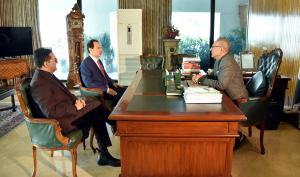
Release of Best Practices for Restitution of Nazi-Confiscated Art
Secretary of State Antony J. Blinken today welcomed the release of Best Practices for the Washington Principles on Nazi-Confiscated Art, which are the result of international collaboration on effective steps to implement the restitution of Holocaust-era art, books, and other cultural objects in line with the landmark 1998 Washington Conference Principles. The Best Practices reinforce the Washington Principles, including by recognizing that forced sales happened and underscoring the urgency of resolving remaining claims for property, whether held in public or private collections.
The Best Practices were prepared by a network of Special Envoys and Representatives for Holocaust Issues from 14 countries and were announced at the 25th Anniversary of the Washington Principles on Nazi-Confiscated Art: Best Practices and the Way Forward event. Cosponsored by the U.S. Department of State and the World Jewish Restitution Organization (WJRO), the hybrid event was held at the U.S. Holocaust Memorial Museum in Washington, DC on March 5 and attended by special envoys, ambassadors, senior government officials, and NGOs.
In pre-recorded remarks aired at the event, Secretary Blinken emphasized that millions of works of art and cultural property stolen by the Nazis still have not been returned to their owners, who often face legal and financial barriers in the process of reclaiming their property. The Best Practices, the Secretary said, will bolster restitution efforts by more precisely defining what is considered Nazi-looted art and remedying processes that favor current possessors over rightful owners. Observing that Holocaust distortion is on the rise, he said that efforts to resolve restitution claims are more important than ever and he encouraged other countries to join the United States in endorsing the Best Practices.
Ambassador (ret.) Stuart E. Eizenstat, the driving force behind the Washington Principles and now Special Advisor to the Secretary of State on Holocaust Issues, gave keynote remarks on the lasting impact of the Principles and how the Best Practices will make a difference on the restitution of Nazi-looted art and for Holocaust survivors. Other speakers included Gideon Taylor, President of the World Jewish Congress and the Conference on Jewish Material Claims Against Germany; Ellen Germain, Special Envoy for Holocaust Issues, U.S. Department of State; Sara J. Bloomfield, Director of the U.S. Holocaust Memorial Museum; and Colette Avital, Chairperson, Center of Organizations of Holocaust Survivors in Israel. Leading international experts participated in a panel discussion about the future of art restitution.
Secretary Blinken’s remarks may be found in the videos section on the State Department website. For more information on the Best Practices and speakers’ remarks, please visit the Remarks and Releases page. On X, follow the Special Envoy for Holocaust Issues @StateSEHI.
List of States endorsing the Best Practices as of March 5, 2024:
Albania, Austria, Belgium, Canada, Croatia, Czechia, Estonia, France, Germany, Greece, Ireland, Israel, Italy, Lithuania, Luxembourg, the Netherlands, Romania, Slovenia, Sweden, Switzerland, the United Kingdom, and the United States.
Official news published at https://www.state.gov/release-of-best-practices-for-restitution-of-nazi-confiscated-art/
Politics - JISIP NEWS originally published at Politics - JISIP NEWS



 SECRETARY BLINKEN: Thank you. Good morning, everyone. SECRETARY BLINKEN: Okay, so here’s a professional tip. Never follow Sara Minkara. (Laughter.) It’s a little bit like getting on stage after Taylor Swift. (Laughter.) Sara, it’s not just that I’m proud of you; it’s that I’m grateful for you, and for your entire team. The work that […]
SECRETARY BLINKEN: Thank you. Good morning, everyone. SECRETARY BLINKEN: Okay, so here’s a professional tip. Never follow Sara Minkara. (Laughter.) It’s a little bit like getting on stage after Taylor Swift. (Laughter.) Sara, it’s not just that I’m proud of you; it’s that I’m grateful for you, and for your entire team. The work that […] There is a lot of pro-Putin bias in the Western world. We aim to dispel this “macho” propaganda and reveal true colors of his regime: murder, intimidation, industrialized kleptocracy and well-funded russian fascism propaganda machines. We were born in Russia, we have lost friends to this murderer… we see how he “zombifies” most and intimidates […]
There is a lot of pro-Putin bias in the Western world. We aim to dispel this “macho” propaganda and reveal true colors of his regime: murder, intimidation, industrialized kleptocracy and well-funded russian fascism propaganda machines. We were born in Russia, we have lost friends to this murderer… we see how he “zombifies” most and intimidates […] The United States offers our deepest congratulations to Maia Sandu on her reelection as President of Moldova. President Sandu is the first Moldovan president to win a mandate for a second term by popular vote, a historic achievement. We commend the people of Moldova for their commitment to a democracy that reflects the will of […]
The United States offers our deepest congratulations to Maia Sandu on her reelection as President of Moldova. President Sandu is the first Moldovan president to win a mandate for a second term by popular vote, a historic achievement. We commend the people of Moldova for their commitment to a democracy that reflects the will of […]